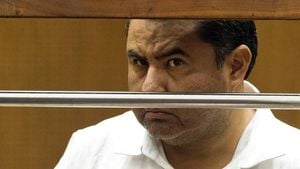The emergence of DeepSeek AI, developed by the Chinese startup DeepSeek Inc., has generated considerable international discussion, making headlines for its rapid rise to prominence as it recently overtook OpenAI's ChatGPT as the top free app on the Apple App Store. This development has incited both admiration and scrutiny across the globe, with various stakeholders weighing in on the significance of this Chinese-developed AI model.
Union IT Minister Ashwini Vaishnaw provided high praise for DeepSeek during an event held on February 1, 2025, noting how the company achieved remarkable success with its AI assistant after only investing $5.5 million. Vaishnaw emphasized this accomplishment, especially when compared to India’s own ambitious IndiaAI mission, which was launched with a considerable budget of $1.25 billion. He stated, “Some people question the amount of investment the government has committed to IndiaAI mission. You have seen what DeepSeek has done? $5.5 million and a very very powerful model.”
This statement reflects the rising optimism surrounding India’s potential role within the international AI ecosystem, particularly against the backdrop of DeepSeek’s ability to swiftly develop its powerful AI using Nvidia’s H800 chips.
Conversely, the success of DeepSeek has also prompted concerns about data privacy. Italy has emerged as the first country to impose restrictions on the AI app following action from its data protection authority, Garante. The regulator expressed serious concerns over DeepSeek’s data practices, reprimanding the company for providing “totally insufficient” information about how it processes personal data, particularly with respect to whether this information may be stored within China.
The alarm was raised when Euroconsumers, a consumer rights group, filed complaints against DeepSeek’s data handling practices. Confirming the urgency of the situation, Garante stated, “The data of millions of Italians is at risk.” The regulator’s investigation highlighted the serious risks posed by AI applications, shedding light on broader concerns surrounding international data usage and privacy standards.
Italy's action did not go unnoticed, as Ireland's Data Protection Commission and South Korea’s privacy watchdogs have signaled their intent to follow suit by requesting similar information from DeepSeek. This cumulative scrutiny demonstrates growing international apprehension about the safeguarding of personal data and the ethical deployment of AI technologies.
Back across the Atlantic, U.S. Navy officials expressed concern as well, advising personnel to avoid using DeepSeek, underscoring potential security risks associated with the app. The wave of caution from significant institutions reflects broader questions about the vetting of AI technologies and their compliance with privacy regulations.
Meanwhile, the reaction from the tech industry has also been significant. Tim Cook, the CEO of Apple, faced scrutiny after praising DeepSeek during the company's recent financial results announcement. Cook remarked, “I think innovations which increase efficiency are good, and that's exactly what we see on this model.” His comments sparked outrage on social media, especially among those questioning why Apple seemingly overlooked ethical issues related to data privacy and the app's development methods.
With the backdrop of these conflicting narratives surrounding DeepSeek, questions are mounting about the extent of innovation versus ethical responsibility within the competitive global AI market. The contrasting views from policymakers and corporate leaders highlight the urgent need for dialogue on the international stage about regulations governing AI technologies.
Conclusion: The rise of DeepSeek AI marks not just the emergence of a formidable player within the artificial intelligence sector, but also serves as a litmus test for international norms around data privacy and corporate responsibility. How DeepSeek and its global counterparts navigate this complicated terrain will undoubtedly shape the future of AI innovations and the public's trust moving forward.



